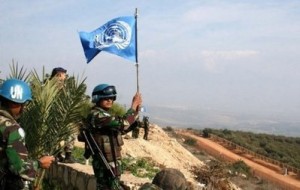
Gérard Araud, Permanent Representative of France to the United Nations said recent confrontations between UNIFIL troops and villagers in southern Lebanon were “not spontaneous,” Al-Akhbar daily reported Thursday.
“These incidents were neither isolated nor spontaneous,” Al-Akhbar quoted him as saying.
He stressed on the need to ensure freedom of movement of UNIFIL in accordance with Section XII of 1701, calling for disarmament of Hezbollah under U.N. Resolutions, particularly 1559 and 1701.
On July 3, a UNIFIL patrol was attacked and overpowered by residents in the southern village of Kabrikha. Officials said the villagers, after one of them had been arrested, pelted UN troops and seized their weapons.
On June 29, residents attacked a UNIFIL vehicle between the villages of Adeisseh and Kfar Kila. The residents blocked a road and hurled stones toward a UN patrol during what officials termed a “maximum deployment exercise.”
“It is incumbent on the Lebanese authorities to ensure the security and freedom of movement for UNIFIL within its area of operation,” UNIFIL commander Maj. Gen. Alberto Asarta Cuevas said last weekend.
According to observers south Lebanon is Hezbollah’s stronghold and the militant group wanted to send a message through these protests that it is still in control.
One Arab observer who linked the south Lebanon clashes to the Iran sanctions was quoted as saying: ” Hezbollah is trying use the people in the south as barricades to deter the international sanctions on Iran.”
Security pact
France on Thursday defended a controversial security accord with Lebanon as Shiite militant party Hezbollah demanded a clear definition of the word “terrorism” in the text.
“This is a classic agreement like those France’s interior minister has already signed with our foreign partners,” said foreign ministry spokesman Bernard Valero.
“The text includes technical terms, for example, for the fight against organised crime as well as cooperation in … homeland security, crisis management … and decentralized administration,” Valero said in a statement distributed by the French embassy.
The pact stipulates the two countries should “boost cooperation” in fighting terrorism, money laundering and drugs.
Valero’s statement made no mention of the word “terrorism.”
Lebanon and France signed the agreement in Paris on January 21. The accord must be ratified by Lebanese parliament and the French senate to take effect.
Hezbollah has demanded “a text that either clearly defines ‘terrorism’ as per Lebanese and Arab laws or the omission of the clause that deals with counter-terrorism entirely,” Hezbollah MP Hassan Fadlallah told AFP.
“France’s definition of terrorism includes Palestinian resistance movements, and that clashes with Lebanese law, which is in line with the Arab League’s definition,” he added.
“Without resolving this matter, the accord will not be passed in parliament.”
The 22-member Arab League does not regard “armed struggle against foreign occupation,” such as the Palestinian Hamas or Lebanese Hezbollah, as terrorist movements.
Hezbollah’s pro-Western political rivals were outraged at the Shiite party’s demand, slamming the group as “isolationist.”

Leave a Reply
You must be logged in to post a comment.